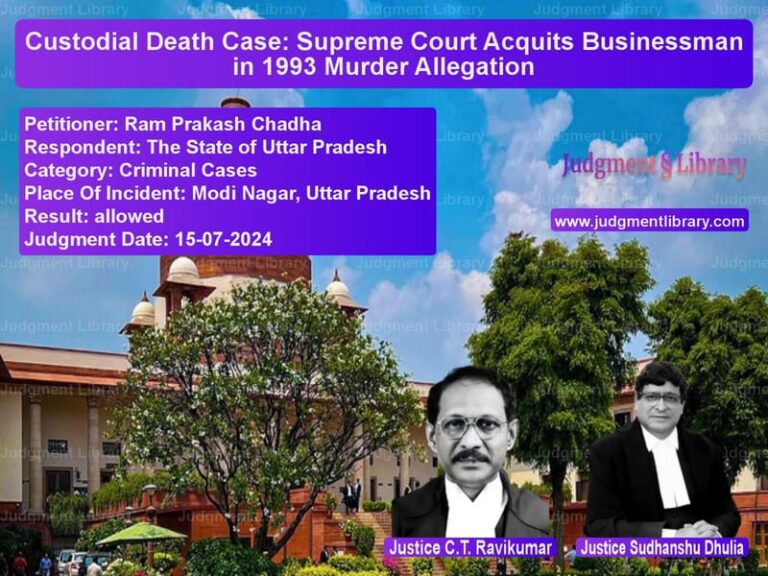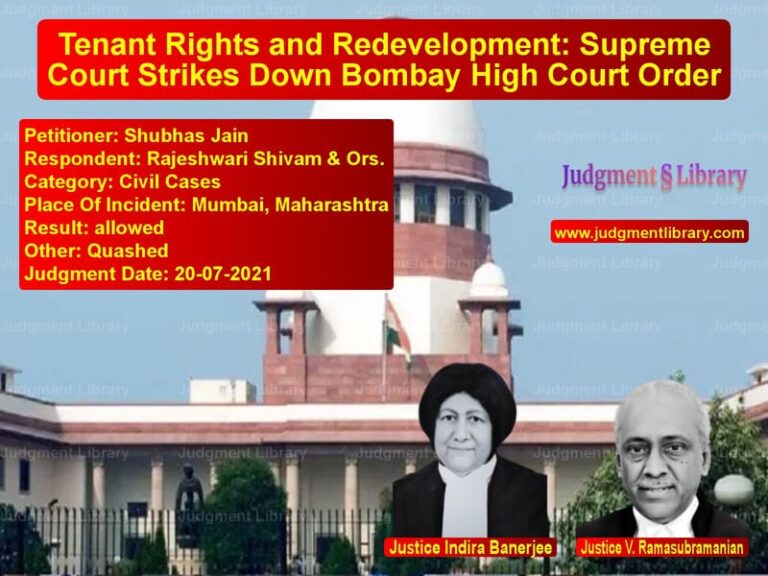Criminal Appeal Abatement: Supreme Court Ruling in Yeruva Sayireddy vs. State of Andhra Pradesh
The case of Yeruva Sayireddy vs. State of Andhra Pradesh involves a legal question on the abatement of a criminal appeal following the death of the accused. The Supreme Court had to decide whether the appeal challenging a conviction for murder under Section 302 of the Indian Penal Code (IPC) should continue or abate after the appellant’s death.
Background of the Case
The appellant, Yeruva Sayireddy, was convicted for the murder of his daughter-in-law. The trial court sentenced him under Section 302 IPC, and this conviction was upheld by the High Court. Aggrieved, the appellant approached the Supreme Court.
However, during the pendency of the appeal, the appellant died after spending nearly 12 years in prison. The question before the Supreme Court was whether the appeal should be continued by a legal representative or be considered as abated under Section 394 of the Code of Criminal Procedure (Cr.P.C.).
Legal Provisions Involved
- Section 394(1) Cr.P.C.: All appeals against conviction abate upon the death of the accused, except in cases involving a sentence of fine.
- Proviso to Section 394(2) Cr.P.C.: A near relative may apply to the appellate court within 30 days of the appellant’s death to continue the appeal.
- Explanation to Proviso: A ‘near relative’ includes a parent, spouse, lineal descendant, brother, or sister.
In this case, no near relative applied to continue the appeal after the appellant’s death.
Petitioner’s Arguments (Yeruva Sayireddy’s Counsel)
The Amicus Curiae appointed by the Court argued:
- The case had strong merits and a high chance of acquittal.
- The legislative intent behind the proviso to Section 394(2) Cr.P.C. was to allow the continuation of an appeal even after the appellant’s death.
- The Amicus Curiae should be allowed to continue the appeal in the interest of justice.
Respondent’s Arguments (State of Andhra Pradesh)
The State argued:
- Under Section 394 Cr.P.C., an appeal abates upon the appellant’s death unless a near relative applies to continue it.
- Since no application was filed by any relative within 30 days, the appeal must abate as per the law.
- The Amicus Curiae is not a ‘near relative’ under the meaning of the provision.
Supreme Court’s Observations
- Section 394 Cr.P.C. explicitly provides that appeals abate upon the death of the appellant unless continued by a near relative.
- An Amicus Curiae, appointed by the Court, does not qualify as a ‘near relative’ and cannot request to continue the appeal.
- Since no family member or legal heir of the appellant came forward to pursue the appeal within the prescribed time limit, the case could not proceed.
The Court observed: “The counsel, as an Amicus, cannot be treated as a near relative of the deceased appellant. The application for continuance of the appeal having not been made within 30 days or even thereafter by any near relative, in our opinion, as per the provision of Section 394 of the Cr.P.C., this appeal would abate.”
Final Judgment
The Supreme Court ruled that:
- The criminal appeal had abated due to the appellant’s death.
- Since no near relative applied to continue the case within the time frame prescribed under Section 394(2) Cr.P.C., the Court had no option but to declare the appeal as abated.
- All pending applications related to the case were disposed of accordingly.
Key Takeaways from the Judgment
- Criminal Appeals Abate Upon Death of the Appellant: If no near relative applies to continue an appeal, it will abate as per Section 394 Cr.P.C.
- Role of Amicus Curiae is Limited: An Amicus Curiae cannot apply to continue an appeal on behalf of a deceased appellant.
- Timeframe for Legal Heirs to Apply: A near relative must file an application within 30 days if they wish to pursue the appeal.
- Finality of Convictions Upon Abatement: When an appeal abates, the conviction remains undisturbed as it was upheld by the lower courts.
Conclusion
This Supreme Court judgment clarifies that criminal appeals do not automatically continue after the appellant’s death unless a near relative comes forward to contest the conviction. The decision upholds the legal principle that appeals should not remain pending indefinitely in the absence of an interested party to carry them forward. This case sets an important precedent for future criminal appeals where the appellant dies before a final decision is reached.
Read also: https://judgmentlibrary.com/supreme-court-overturns-confiscation-of-vehicle-in-cow-slaughter-case/
Petitioner Name: Yeruva Sayireddy.Respondent Name: State of Andhra Pradesh & Another.Judgment By: Justice Vineet Saran, Justice Aniruddha Bose.Place Of Incident: Andhra Pradesh.Judgment Date: 07-03-2022.
Don’t miss out on the full details! Download the complete judgment in PDF format below and gain valuable insights instantly!
Download Judgment: yeruva-sayireddy-vs-state-of-andhra-prad-supreme-court-of-india-judgment-dated-07-03-2022.pdf
Directly Download Judgment: Directly download this Judgment
See all petitions in Bail and Anticipatory Bail
See all petitions in Attempt to Murder Cases
See all petitions in Fraud and Forgery
See all petitions in Theft and Robbery Cases
See all petitions in Custodial Deaths and Police Misconduct
See all petitions in Judgment by Vineet Saran
See all petitions in Judgment by Aniruddha Bose
See all petitions in dismissed
See all petitions in Declared Infructuous
See all petitions in supreme court of India judgments March 2022
See all petitions in 2022 judgments
See all posts in Criminal Cases Category
See all allowed petitions in Criminal Cases Category
See all Dismissed petitions in Criminal Cases Category
See all partially allowed petitions in Criminal Cases Category







